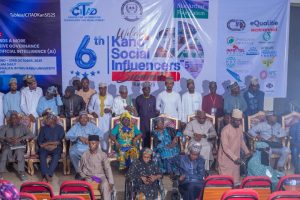
Experts and stakeholders have called for a more inclusive and ethical approach to Artificial Intelligence (AI) governance in Nigeria, emphasizing the need for strong policy frameworks, data protection, and investment in ICT infrastructure.
This was contained in a communiqué issued at the end of the 6th Kano Social Influencers Summit (KANSIS25) organized by the Centre for Information Technology and Development (CITAD), held from Oct. 22 to 23 at Khalifa Isyaku Rabiu University (KHAIRUN), Kano.
The summit, themed “Toward a More Inclusive Governance of Artificial Intelligence (AI),” attracted over 1,200 participants, including academics, ICT experts, policymakers, media practitioners, and persons with disabilities from within and outside Nigeria.
The communiqué, jointly signed by Prof. Amina Kaidal of the University of Maiduguri, Prof. Tunde Akanni of Lagos State University, Chief Nmezi Oguadinma of NSL Consulting, Lagos, and Mr. Isah Garba, Senior Programmes Officer, CITAD, highlighted the need to balance technological advancement with ethical considerations and inclusivity.
According to the communiqué, “Artificial Intelligence is rapidly transforming global development, yet Africa contributes only about 5 per cent of global AI research due to inadequate infrastructure, funding, and gender inclusion.”
It further observed that, “The misuse of AI through disinformation, deepfakes, and misinformation poses grave threats to democracy and social cohesion.”
Participants also noted that while “AI-powered assistive technologies are empowering Persons with Disabilities (PWDs), high costs continue to limit access.”
The summit resolved that a multi-stakeholder platform coordinated by CITAD be established to engage government agencies on revising policy and legal frameworks guiding AI in Nigeria.
It also recommended increased government investment in ICT infrastructure, human capital, and research to strengthen Nigeria’s position in the global AI ecosystem.
“There is an urgent need to enact and enforce data protection laws to curb unauthorized data mining and trading,” the communiqué stated.
The summit further called on stakeholders to promote AI awareness, ethics, and digital literacy among citizens to ensure responsible and inclusive adoption.
In addition, participants urged tech companies and government agencies to subsidize AI assistive technologies to make them accessible and affordable for all citizens.
Commending CITAD for sustaining the platform since 2019, the communiqué stated that, “The KANSIS Summit has become a hub for digital dialogue, innovation, and collaboration, driving a just and democratic digital future for Nigeria.”
The two-day event featured five plenary sessions, 14 breakout panels, and 31 scholarly presentations, addressing topics such as data privacy, deepfakes, AI ethics, and the role of women in AI governance.
Participants also expressed appreciation to Khalifa Isyaku Rabiu University for hosting the event and providing a conducive environment for intellectual exchange.





